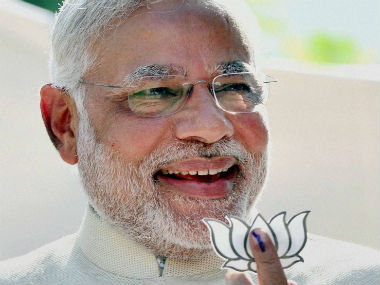The Bhartiya Janata Party (BJP) has tailored itself, rather quickly, to the election dynamics and sensibilities of the electorate in Jammu and Kashmir. On Thursday (27 November), the party released its election manifesto in the winter capital Jammu for the 2014 assembly polls, which makes no mention of Article 370 - and issue that has always figured high on the BJP’s agenda. It was none other than Prime Minister Narendra Modi who created a stir last December during an election rally in Jammu where he called for a debate on Article 370. Minister of State in the Prime Minister’s Office, Jitendra Singh, had ruffled quite a few feathers in Kashmir when he too suggested a debate on the article. In fact, he said stakeholders had already been consulted on the matter. Given that the BJP has been categorically calling for the abrogation of article 370 which grants a special status to J&K, its absence from the manifesto is a remarkable departure for its stated position on the subject. After Modi’s call for a debate, there was sharp criticism from mainstream as well as separatist Hurriyat leaders in J&K. Mainstream parties like National Conference and the People’s Democratic Party used the utterances of Modi to ask people to vote in large numbers so that the BJP could be kept at bay. This could be one reason why the first phase of the state assembly elections saw a record 71 percent voter turnout. Even in roadside conversations in Kashmir, well-meaning people had been thinking that the BJP would sweep the assembly polls if people didn’t participate in polls in large numbers. [caption id=“attachment_1825679” align=“alignleft” width=“380”]  Prime Minister Narendra Modi. PTI/File photo[/caption] That may be the reason why the BJP, instead of talking about the abrogation of article 370, has chosen development and the dignified return of Kashmiri Pandits to the Kashmir Valley as its main poll plank. “We are fighting these elections on the issue of development. On the rest of the issues we have made our stand clear,” Avinash Rai Khanna, state in-charge of the BJP, told reporters in Jammu after releasing the party’s “Vision Document”. “The BJP is not a state-level party. It is a national party and its nationalistic agenda is for the abrogation of Article 370. This manifesto looks like the perfect example of an election ploy, nothing else. They have intentionally or unintentionally made article 370 an issue. This can benefit the party in certain areas of the state but not with the majority,” Naeem Akhtar, chief spokesperson of the People’s Democratic Party told Firstpost. Clearly, electoral compulsions in the Kashmir Valley have forced the party to moderate its article 370 stand. However, this is not the first time this issue has gone missing from the party manifesto. In the 2008 assembly elections, in which BJP managed to win 11 seats riding on the Amarnath land row, there was no mention of the article in its manifesto. A senior BJP leader who didn’t wish to be named told Firstpost that article 370 was “in our hearts” and it “doesn’t matter if it was in the party manifesto or not.” A political analyst in Kashmir said the poll manifesto of BJP was intended to garner as much support as the party can for the assembly elections. “The top BJP leadership in the state knows that Kashmiri Pandits will vote for it only if the party promises their resettlement, development and reservations for them in the state assembly,” the analyst said. The vision document says that the BJP would initiate a process for the just and honorable resettlement of the Kashmiri Pandits and underlines the “TIME” model for development of Jammu and Kashmir - TIME being an acronym for tourism, infrastructure, modernisation and empowerment. Apart from article 370, other issues like renaming of the state as Jammu, Kashmir and Ladakh, a proposal to cut short the assembly’s tenure to five years instead of six, and state subject status to daughters who have married outside the state and to their children - some of the top issues for BJP in the run up to the polls - are also missing in the “Vision Document”. In April 1950, Dr Shyama Prasad Mookerji, the founder of the Jana Sangh (precursor to the BJP), after resigning from Jawaharlal Nehru’s cabinet as Civil Supplies Minister, founded the Praja Parishad which supported eliminating article 370 and avoid creating a republic within a republic. “Ek desh mein do vidhan, do nishan, do pradhan, nahin chalega,” used to be the dominant slogan of the Parishad. In the peak days of the movement in 1952, the Sheikh Abdullah government in Kashmir used bamboo sticks against Parishad activists and leaders, many of whom were arrested. During one of these tours, Dr Mookerji appeared in the winter capital Jammu. He was arrested on 11 May 1953 from the Lakhanpur frontier area and driven to Srinagar where he died, apparently because of a heart attack, on 23 June 1953. His death gave a fresh lease of life for the Nehru government’s policy of “gradual assimilation” of J&K into India. The BJP always talks of Mookerji when it comes to the issue of Kashmir, saying its leader had given life for integrating the state with the Indian union. Nehru too learnt many lessons in dealing with the Sheikh. But with the BJP aiming to be a key partner in power, if not a majority party, article 370 is no longer the party’s calling card in the Kashmir, it seems.
Given that the BJP has been categorically calling for the abrogation of article 370 which grants a special status to J&K, its absence from the manifesto is a remarkable departure for its stated position on the subject.
Advertisement
End of Article


)
)
)
)
)
)
)
)
)



